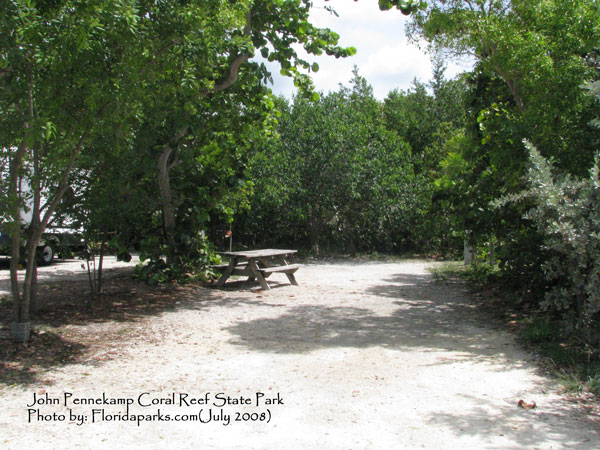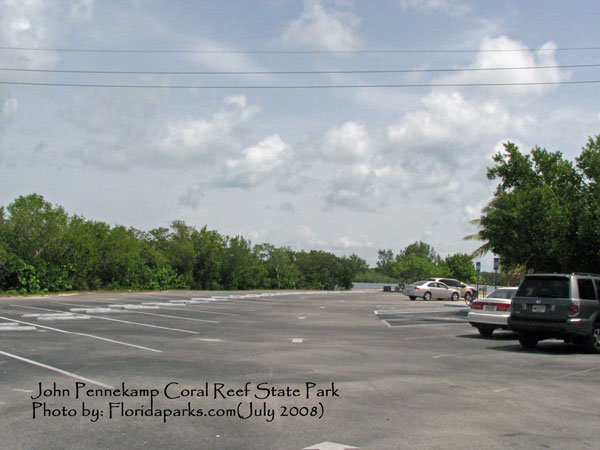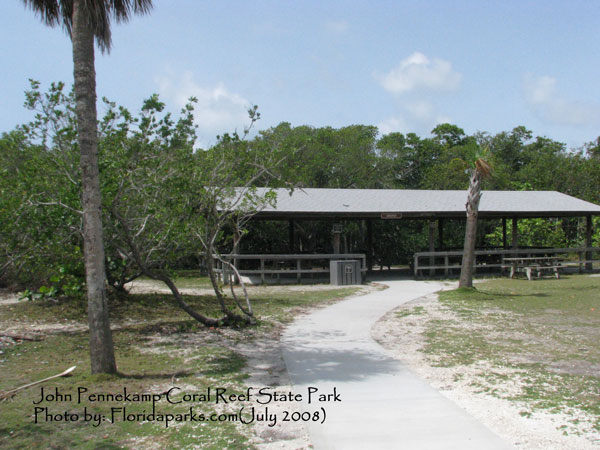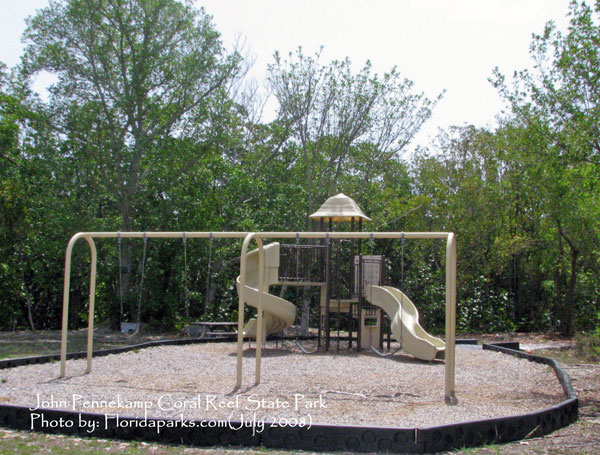Site Search
Florida State Parks
- NORTHWEST FLORIDA
- Pensacola Area
- Panama City Area
- Tallahassee Area
- Alphabetical Order
- NORTHEAST FLORIDA
- Gainesville Area
- Jacksonville Area
- Ocala Area
- Lake City Area
- Alphabetical Order
- CENTRAL FLORIDA
- Daytona Beach Area
- Orlando/Kissimmee Area
- St. Augustine
- Alphabetical Order
- SOUTHWEST FLORIDA
- Tampa Area
- Fort Myers Area
- Naples Area
- Alphabetical Order
- SOUTHEAST FLORIDA
- West Palm Beach Area
- Fort Lauderdale Area
- Miami Area
- Florida City Area
- The Keys
- Alphabetical Order
- USEFUL LINKS
- Alphabetical Listing
- Parks with Camping
- Parks Admitting Pets
- RV Campsites
- Pet Policy
- Fee Schedule
NEW LISTINGS |
Check For Deals
John Pennekamp Coral Reef State Park
Contact Information
P.O. Box 487
Key Largo, 33037
(305) 451-1202 / Reservation: 1-800-326-3521
The following numbers are provided for information concerning various activities.
Glass bottom boat, Snorkeling, Sailing/ Snorkeling
tours:
305-451-6300
Scuba tours and instruction:
305-451-6322
Boat rentals:
305-451-6325
General park information:
305-451-1202
 Beach Area |
 Boat Ramp Area |
 Campsite Area |
 Parking Spaces |
 Picnic Area |
 Visitor Center |
 Other Area |
The first undersea park in the United States, John Pennekamp Coral Reef State Park, and the adjacent Florida Keys National Marine Sanctuary, cover approximately 178 nautical square miles of coral reefs, seagrass beds and mangrove swamps. The park extends 3 miles into the Atlantic Ocean and is approximately 25 miles in length.
These areas were established to protect and preserve a portion of the only living coral reef in the continental United States.
The park is named for the late John D. Pennekamp,
a Miami newspaper editor, whose efforts contributed
to the establishment of Everglades National Park
and the preservation of what would become John
Pennekamp Coral Reef State Park.
Hours of Operation
Florida state parks are open from 8 a.m. until
sundown 365 days a year.
Driving Directions
John Pennekamp Coral Reef State Park is located
on US highway 1 at mile marker 102.5, north of Key
Largo in the Florida Keys.
Vacation
Rental link to Florida Keys
Hotel
link to Key Largo Florida USA:
The first undersea park in the United
States, John Pennekamp Coral Reef State Park, and
the adjacent Florida Keys National Marine Sanctuary,
cover approximately 178 nautical square miles of
coral reefs, seagrass beds and mangrove swamps.
The park extends 3 miles into the Atlantic Ocean
and is approximately 25 miles in length.
These areas were established to protect and preserve a portion of the only living coral reef in the continental United States.
The park is named for the late John D. Pennekamp,
a Miami newspaper editor, whose efforts contributed
to the establishment of Everglades National Park
and the preservation of what would become John
Pennekamp Coral Reef State Park.
Park Activities
Beaches
John Pennekamp Coral Reef State Park has two manmade beaches, each with its own distinct personality. Cannon beach is the parks primary snorkeling beach, where you will find the remnants of an early Spanish shipwreck approximately 100 feet offshore. Far beach, with it’s palm trees is a relaxing place to swim, or just sit and enjoy the sun. Any swimming or snorkeling done outside of the designated swimming areas is prohibited, unless a diver down flag is properly displayed.
Boat Ramp
The park has a very good deep water boat ramp, the ramp is located at the marina. The ramp can handle most boats up to the 36 foot range.
Boat Tours
John Pennekamp Coral Reef State Park has four different types of boat tours to ensure that all park visitors have the best opportunity possible to experience the park's coral reef system.
Glass bottom boat tours: These 2 ½-hour tours allow for 1 ½ hours of water time to view the parks living coral reef and its many inhabitants up close and personal. These trips depart from the parks docks three times a day, 365 days a year, weather permitting.
Sailing/ Snorkeling tours; Our Sailing/Snorkeling tours depart daily aboard a 38-foot catamaran. These four-hour tours provide 1.5 hours of snorkeling at one locatyion on the coral reef. Tours depart daily at 9:00 a.m. and 1:30 p.m. Rental equipment is available. The park also has a dive shop which is a PADI Resort Facility, offering a full range of courses from Open Water through Instructor. Our specialty courses introduce you to diving and our coral reef in one day with the Resort Course.
Scuba diving tours: These four-hour tours allow
divers two dives at a different location.
Boating
Boaters should always use caution in shallow reef
areas and when approaching any area where there
are diver down flags displayed, swimmers, or moored
boats. Always obtain a navigation chart before departing
for open water. Combustible engines are not permitted
in or near shore areas of the park where the water
is less than four feet deep. For those boaters that
do not have a boat, the park concession maintains
a boat rental where boats may be rented for four
hour and eight hour intervals.
Boat slips and moorings are available at the marina
for overnight rental. Slips are located in the marina
and include water and electric hookups with bathroom
and shower facilities nearby. Mooring buoys are
located in Largo Sound with dingy dockage at the
marina. both include full use of park facilities,
trash disposal, and pump-out. Reservations are recommended.
For more information you may contact the marina
at 305-451-6322 or on VHF channel 16.
Campfire Circle
From mid November to early April the Park Rangers
hold a Friday night camp fire circle where various
programs on the local environment, wildlife, activities,
or local history are given in an informal atmosphere.
Canoeing
You can explore the parks 2 ½ miles of marked
mangrove wilderness trails. The mangroves, and the
crystal clear waters which surround them provide habitat
for a wide variety of birds and marine life.
Concessions
Maintains a lunch counter and snack bar. Gifts and
snorkeling equipment for the beach area may also
be obtained at the concession.
Fishing
Fishing is permitted in designated areas in accordance with Florida State Law . Saltwater fishing licenses are required for out of state visitors. Spearfishing, possession of spearfishing equipment, and collection of tropical fish [by any method] is prohibited inside the park.
Full Facility Camping
Our campgrounds offer 47 full-facility camping sites for both tents and RV campers. Restrooms, with hot showers, are available as are laundry facilities. Reservations are recommended well in advance. Campers can register at the park entrance. Pets are not allowed in the campground.
Nature Trails
The park maintains two nature trails each in a uniquely different environment. The Wild Tamarind Trail winds through the parks beautiful tropical hardwood hammocks, allowing visitors to view many of the areas native hardwood species. The Mangrove Trail winds peacefully through the mangroves and over the mangrove estuaries allowing visitors to view this unique environment up close and personal.
Nature walks for organized groups need to be requested
in advance, if possible to ensure that a Park Ranger
is on duty for the walk.
Picnicking
Designated areas for picnicking are located throughout
the park. Barbecue grills are provided, no ground
fires are permitted. The park has 12 pavilions for
use on a first-come, first-served basis. Reservations
for the pavilions are accepted. The 11 small pavilions,
with two picnic tables each, rent for $30.00 per
day, plus tax. The large pavilion has eight tables
and rents for $50.00 per day, plus tax. None of
the pavilions are equipped with electric or water.
Whether on land or the water, please do not litter.
Scuba Diving
To fully enjoy the diving possibilities of the park,
boat trips to the reef are recommended. A new diver
or a diver that needs a refresher, finds the waters
of cannon beach a great place to hone their skills.
Snorkeling
In addition to the parks snorkeling tours, there
are areas in the park designated for snorkeling
. These areas are in a tropical lagoon and offer
a look at the various sea grass communities in the
park. In these areas there are some natural ledges
that do hold some interesting marine life, there
are also some artifacts from on early Spanish shipwreck
approximately 100 feet offshore.
Swimming
Swimming is a popular activity at both cannon beach
and far beach. the swimming areas being located
in a tropical lagoon offers a good place for the
younger swimmers to get a chance to enjoy the water.
Visitor Center
The highlight of the parks visitor center is its
30,000 gallon saltwater aquarium, the staff conducts
a fish feeding for park visitors at 11:00 A.M. daily.
There are also Six additional 100-200 gallon aquariums
which offer the visitor different looks at the parks
marine inhabitants. The visitors center also features
natural history exhibits, which interpret the parks
unique marine environment. The park has a theater
where visitors may view nature videos relating to
the park and its surrounding area. The hours of
operation are 8:00 A.M.- 5:00 P.M., daily.
Youth Camping
The youth camping area is available for organized
youth groups only. The site has a fire circle, benches
and picnic tables. There is no electricity at the
site. Restrooms and hot showers are available. The
youth camping area will accommodate up to 24 people.
There must be at least one (1) adult chaperone per
ten (10) youths, and no more than one (1) adult
chaperone to three (3) youths. Chaperones must be
at least 21 years of age. Reservations for the youth
camp can be made 11 months in advance by calling
the park at (305) 451-1202. A representative of
the group must check in before 5:00 pm on the day
of arrival. All park rules and regulations apply
to this campsite.
